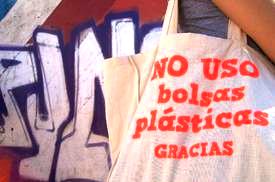![]()
An alternative to not using plastic bags
Plastic bags, made from oil and gas, have an estimated lifespan of 1,000 years before breaking down into tiny toxic particles. The resulting pollution is extremely dangerous, with the Blue Ocean Society for Ocean Conservation estimating, for example, that there are 46,000 pieces of plastic trash in every square mile of ocean.
An initiative to reduce this impact has already been implemented in Ecuador since November of last year and consists of replacing the plastic bags used in bakeries with environmentally friendly ones.
“They are 100% ecological and degrade between 60 and 90 days under natural conditions,” explains Freddy Jácome, general manager of Publipan (the franchise that created the alternative).
One of the places where the most plastic bags are distributed are bakeries, so this initiative seeks to remove nearly 10 million bags from the market in these establishments in one year nationwide.
"We have been selling bread in these types of bags for about three months," said María Basurto, an employee at one of the distributors located in Cumbayá (Quito).
These eco-friendly bags are made from degradable paper, water-based inks and chemical-free glue, so they can even be used as fertilizer for plants, according to Jácome.
So far, they have distributed 120,000 copies, which are free of charge, since they are financed by the advertising printed on their paper.
The initiative was launched in Spain in 2005 and since then it has prevented 70 million plastic bags from polluting the planet, as the franchise is located in 10 countries.
Prohibition policy
Many governments have banned the distribution of plastic bags because of the danger they represent. Among the countries where the use of these items is not permitted by law are: France, Denmark, Ireland, China, Switzerland and Italy.
“This should be a government policy worldwide, because there are many alternatives to avoid its use,” says Carlos Beltrán, an expert on environmental issues.
Ecuador is the first country in South America to implement the initiative. At the moment, these bags are already being distributed in Quito and Guayaquil.
Another option is reusable bags to avoid the long decomposition and environmental contamination caused by plastic bags.
At a global level there are 10 countries: Spain, Portugal, Romania, Germany, Costa Rica, Brazil, Colombia.
Panama, Republic of Moldova, Ecuador.

